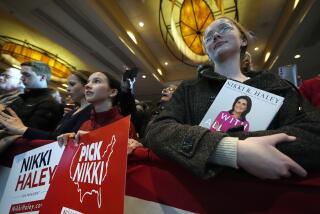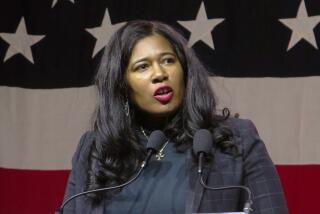As Mitt Romney surges, Republican divisions sharpen
A fusillade of attacks on front-runner Mitt Romney presages what is likely to be at least a month of internal warfare among Republicans as the presidential candidates head for the South, the heart of the GOP’s restive base.
The campaign’s longtime dynamic shifted forcefully Sunday, as several trailing candidates tried to take down Romney before he more firmly grasps the Republican presidential nomination. He’s a heavy favorite in Tuesday’s New Hampshire primary, but immediately ahead is South Carolina, where his foes are already on the ground and beaming new, more corrosive charges over the airwaves.
Some of what is powering the increasing acrimony among the candidates is personal disdain. But it also reflects profound differences between sectors of the Republican Party.
“This is a more doctrinaire Republican base than we had seen in the last 25 years,” said Andrew Kohut, president of the independent Pew Research Center. “It is much more hard-core than in the past.”
In particular, he said, highly energized elements on the GOP right “are looking for a rebellious kind of candidate,” as reflected in polls and initial voting results that show a majority of Republicans unwilling to fall in line behind button-down Romney.
Those schisms were on display in a “Meet the Press” debate Sunday that featured the sharpest, most sustained anti-Romney assault of the Republican contest. His opponents, behind in the polls and increasingly desperate to gain ground, portrayed the former Massachusetts governor as a shape-shifting opportunist and a closet moderate out of step with most of the party’s primary voters.
“Can we drop a little bit of the pious baloney?” Newt Gingrich retorted after Romney had argued that, unlike others on the Concord, N.H., debate stage, he wasn’t a career politician.
“You’ve been running consistently for years and years and years,” the former House speaker said, reminding Romney of his unsuccessful runs for U.S. Senate in 1994 and the presidency in 2008. “So this idea that suddenly citizenship showed up in your mind — just level with the American people.”
Terming Romney a “timid Massachusetts moderate,” Gingrich predicted that he would have “a very hard time” defeating President Obama as the Republican nominee.
The pummeling in the NBC debate, the second of two network encounters over the weekend, came as Romney proudly boasted that he had run for governor to make a difference, and, having done so, didn’t feel compelled to seek a second term.
“I didn’t go there to begin a political career, running time and time again,” he said. “Run again? That would be about me.”
Like Gingrich, former Sen. Rick Santorum of Pennsylvania added to the onslaught on Romney. Santorum said that while he was winning election in 1994, Romney “ran from Ronald Reagan” and “said he was going to be to the left of Ted Kennedy on gay rights, on abortion, a whole host of other issues” in his unsuccessful attempt to unseat the liberal Massachusetts Democrat.
The sometimes-personal exchanges underscored the insoluble strains of Republicanism warring this year — including supporters of the tea party movement and those with extremely conservative views across the board, and the libertarians drawn to Ron Paul’s eclectic mix of tightfisted fiscal conservatism, largely liberal social views and isolationist foreign policy.
The first Southern primary, on Jan. 21 in South Carolina, is fast shaping up as a pivotal contest. Social conservatives are a dominant force there, and Romney’s efforts to win them over could be complicated by an exchange in Sunday’s debate. Asked by a panelist when he had last spoken out for increasing gay rights, Romney replied, “Right now.”
Already, an independent group supporting Gingrich is ratcheting up the pressure on Romney in South Carolina over economic issues in a state with a jobless rate close to 10%. The “super PAC” that calls itself Winning Our Future plans Monday to begin a $1-million-plus advertising campaign to highlight layoffs at companies taken over by Bain Capital, a venture capital firm co-founded by Romney. Obama’s campaign and the Democratic Party are already hitting Romney from the left along the same contours.
The dilemma for Romney: The longer the primary race goes on, the greater the chance that he might suffer significant political damage, either from attacks or a self-inflicted gaffe. To limit that risk, he could decide to participate in only half of the four debates on this month’s calendar, two each in Florida and South Carolina.
“Stay tuned,” campaign spokesman Eric Fehrnstrom said Sunday, when asked whether Romney might accept just one debate invitation in each state. But ducking debates could make him look either presumptuous or weak, reinforcing attack lines from opponents who say he is arrogant and lacks the boldness Republican voters are looking for this year.
No one is predicting wholesale defections were Romney to win the nomination. But the tone of the campaign in the weeks ahead and efforts to pull the party together later could threaten what polls show is a major GOP advantage: an enthusiasm gap that strongly favors the Republicans over Obama and the Democrats.
Nelson Warfield, a GOP veteran who recently joined Texas Gov. Rick Perry’s campaign, said predictions about damage in November from an acrimonious primary battle rarely materialize. He cited the 2008 fight between Obama and Hillary Rodham Clinton as an example.
At the same time, he cast doubt on Romney’s apparent strategy of staying as close as possible to the center and assuming that anger at Obama will be enough to win in November. Supporters of the tea party movement, he said, “can’t be treated as default Republican voters. They have to be enthusiastic and engaged, and that’s a problem for Romney.”
Conservative activist Bay Buchanan, a Romney supporter, said the intensified attacks on the front-runner were to be expected and that Romney was “unscathed, as of yet. What will happen in South Carolina, we’ll have to see.”
A stop-Romney strategy session of evangelical Christian leaders planned in Texas next weekend was only one manifestation of a party that remains splintered as the primary season begins in earnest.
“You can go back as far as the Reagan days. I mean, we couldn’t stand the Bush people,” said Buchanan, a top official of Reagan’s 1980 campaign. “And so what did [Reagan do]? He picked [George H.W.] Bush for the vice president.”
The same thing happened in 2008, she said: “I never thought I could even endorse McCain, and he picks [Sarah] Palin, and the next thing you know I’m out there cheering.”
If Romney becomes the nominee, she said, “he is obviously going to have to reach out to these other segments that are not supporting him. He’s going to have to peel away some of their support, week by week by week, and then pull everybody together with a vice presidential nomination. Politics 101.”
More to Read
Start your day right
Sign up for Essential California for news, features and recommendations from the L.A. Times and beyond in your inbox six days a week.
You may occasionally receive promotional content from the Los Angeles Times.






